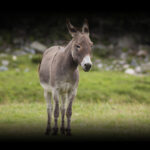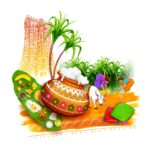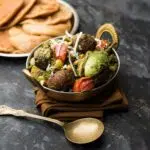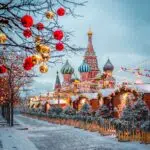Pongal will be celebrated on January 15, which is the first day of the month of ‘Thai’ that inaugurates the Tamil New Year. It is a traditional festival to convey gratitude to the Sun God for an abundant agricultural harvest and to ring in a prosperous year. It coincides with other harvest festivals all across India.
History of Pongal
Pongal is actually celebrated for four days, beginning on the last day of the ninth month of the Tamil calendar, which is called ‘Margazhi,’ so the festival day is, in fact, the second day of the observance. The third day of the tenth month of ‘Thai’ is, therefore, the fourth and last day of the festival. This is why it is also called ‘Thai Pongal.’There are many stories associated with the origin of Pongal in Hindu mythology. One such involves Lord Krishna in his first hometown of Gokula, the “place of cows.” Krishna wanted to teach Indra, the rain god, a lesson in humility. It was the day of Indramaha, the day the villagers worshipped Indra. Krishna suggested that the villagers worship a hillock, Govardhana, and the cows and bulls of the village that provide them with their livelihood. Indra flooded the village out of rage after witnessing the villagers’ actions. Krishna lifted the entire hill of Govardhana on his little finger and held it up like an umbrella against the rain. When Indra realized the divine form of Vishnu in Krishna, he was repentant and accepted the new form of worship ordained by Krishna.Another story involves Lord Shiva and his bull, Nandi. Shiva asked Nandi to descend to Earth and tell the people to eat only once a month and have an oil bath every day. Nandi got the message wrong, or decided to invert the message, asking people to eat every day and have an oil bath once every month. Shiva was so angered upon hearing this that he asked Nandi to live on Earth and help humans plow their land and reap a harvest so that they could eat every day.
Pongal timeline
According to some of the earliest records, the festival is celebrated in the Sangam era.
Kulottunga I reigns and grants land to the Veeraraghava temple for Pongal festivities.
2.5 million women gather to cook pongal in the state of Kerala and break their own previous world record gathering of 1.5 million women in 1997.
Delegate David Bulova of Virginia introduces a joint resolution in the state’s lower house legislature to designate January 14 as Pongal Day.
Pongal FAQs
What does Pongal mean in Tamil?
The term denotes something overflowing, which is the boiling rice in the pot that is prepared for the festival.
Is Pongal the same as Sankranthi?
The new harvest is celebrated all across India, where it is called Sankranthi, Uttarayan, or Bihu, and Pongal denotes the Tamil way of celebrating the same festival.
How do you make pongal?
The traditional sweet pongal recipe is made by boiling rice with milk, green gram, and jaggery. Other additions like cashew nuts, cardamom, and raisins may be used along with ghee.
How To Observe Pongal
-
Visit a Tamil friend
Pongal is celebrated by Tamils across India and by diaspora Tamilians all over the world. Witness the celebrations up close by visiting a Tamil friend’s home or community space. Besides, there may be a variety of pongal dishes to choose from.
-
Make pongal
The traditional way to make pongal involves preparing a sweet, milky dish topped with ghee and cashew. If you don’t fancy the sweet indulgence, there are also salty and savory pongal varieties to prepare and relish. If you still don’t fancy pongal, there are variations in the form of khichdi, and even Sri Lankan and Egyptian versions called ‘mung kiribath’ and ‘koshari.’
-
Draw kolams
If you are artistic but you are not into either the festival or dish, you can consider looking up kolam patterns associated with Pongal and other festivals, and draw them on the street outside your house or inside. Kolams are traditionally drawn with rice powder, but chalk powder is also widely used now. Drawing and reproducing a beautiful, geometric design is a challenging task, and you can even add color to it with the right powders.
5 Interesting Facts About The Pongal Celebrations
-
There’s a bonfire on the first day
The last day of the month of Margazhi is marked as ‘Bhogi Pongal’ and a bonfire is lit to consume old, unwanted things to make way for the new.
-
Cows and bulls are celebrated
Just as Krishna ordained, cattle are given special importance on the third day, which is called ‘Mattu Pongal.’
-
There is a cattle race
There is a controversial tradition of organizing bullfights called ‘Jallikattu.’
-
The last day is for reunions
This day is called ‘Kaanum Pongal,’ which means to “see” relatives and friends, but some also recognize it as ‘Kanya Pongal,’ a day for brothers and sisters to share gifts and money.
-
Kites are flown elsewhere in India
Kites symbolize the turn of the season away from winter and into the coming spring, and are flown on this day in Gujarat and many other places.
Why Pongal is Important
-
It is a community festival
According to anthropologist Andre Beteille, Pongal is a time to renew social bonds. Many times, women get together in a community space to cook pongal together. It is a time to not just wish for prosperity for your own family but to also share it with the larger community.
-
It shows gratitude for the agricultural harvest
The day recognizes the work of farmers and the gift of a good harvest for their families and everyone else consuming the crops. Many farmers in India still rely on the sun and rain for a good crop, and they worship them on this day.
-
We can cook pongal
There are many varieties of pongal to suit each palate. There is a spicy, savory version for those who do not like the traditional sweet dish. Regardless of what you choose, it is a simple, comforting dish to make and it requires few ingredients.
Pongal dates
| Year | Date | Day |
|---|---|---|
| 2023 | January 15 | Sunday |
| 2024 | January 15 | Monday |
| 2025 | January 14 | Tuesday |
| 2026 | January 14 | Wednesday |
| 2027 | January 15 | Friday |

























